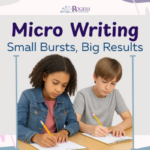** Contact us if you would like Rogers Education Consulting to come to your campus with engaging, evidence-based, and practical professional development **
 Anyone who knows me knows I’m a strong proponent of Writers’ Workshop and making sure students in grades K-12 are writing – EVERY DAY. Writing is hard and if we want students to improve in writing, it’s vital that students practice doing it regularly. After multiple conversations with students and teachers this week, I feel the need to add on to my convictions and say that, in addition to writing every day, students must be also be editing and revising every day!
Anyone who knows me knows I’m a strong proponent of Writers’ Workshop and making sure students in grades K-12 are writing – EVERY DAY. Writing is hard and if we want students to improve in writing, it’s vital that students practice doing it regularly. After multiple conversations with students and teachers this week, I feel the need to add on to my convictions and say that, in addition to writing every day, students must be also be editing and revising every day!
What I found through conversations and questioning is that many teachers were putting journal prompts (or something similar) on the board or response type questions and students were, in fact, writing every day. In some cases, all the writing was being read and perhaps even graded, in other cases, they were only shared by the student. While, I agree that this counts as “writing every day” and that it is better than writing periodically or hardly ever(*gasp*), simply writing words on paper is not going to lead to drastic improvements in the students’ writing.
Much of the desired improvement will come when teachers are providing mini-lessons on specific ways to improve the paper (in revising and editing) and then students are provided time to try these strategies. So, if you have students write a journal entry or respond in writing or just write on a topic they choose, make sure they are getting into their work and getting “dirty” after they’ve written it. They need to go back in and try to improve the lead or make sure their sentences are complete or improve the transitions. If the students are in their own papers doing this hard work, they will be learning how to be a stronger writer. 
Don’t forget the last important part of this equation: conference with the students! Sit down with each student, at least once a week, and talk to them about their writing. Don’t write on their paper or fix mistakes, just be present as a listener. Hear what they have been writing about and what they’re struggling with, and then offer a (yes – one!) suggestion.
So, yes, writing every day will improve the students’ ability to write, but to become strong writers, students need more. They need to be editing and revising daily with strong instruction and conferences!
How do you fit editing and revising in your day?



Thank you for sharing!